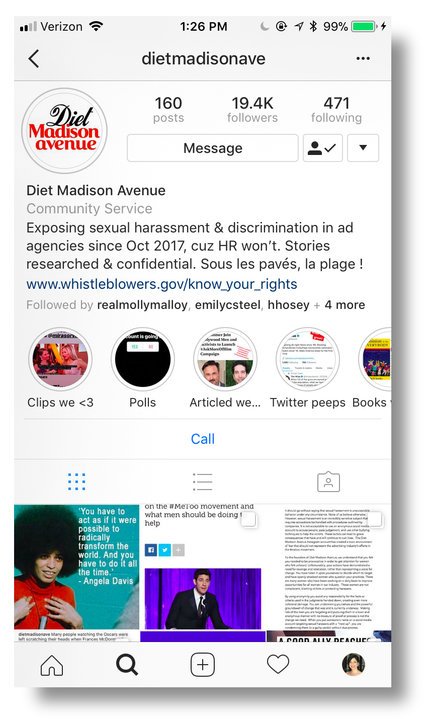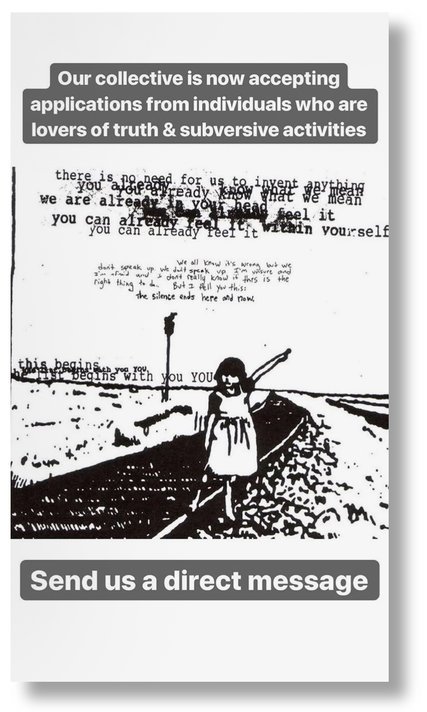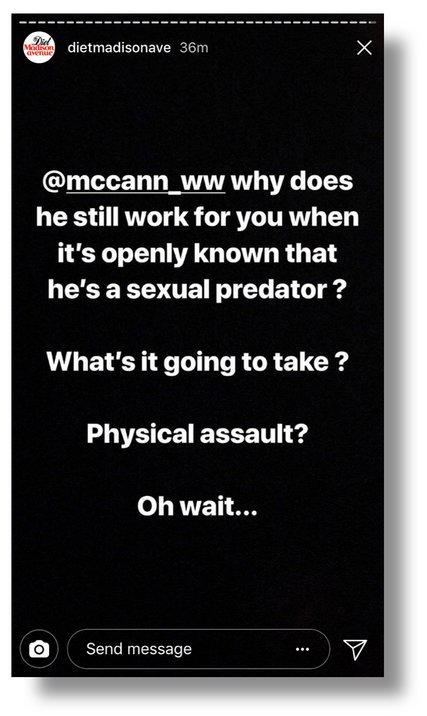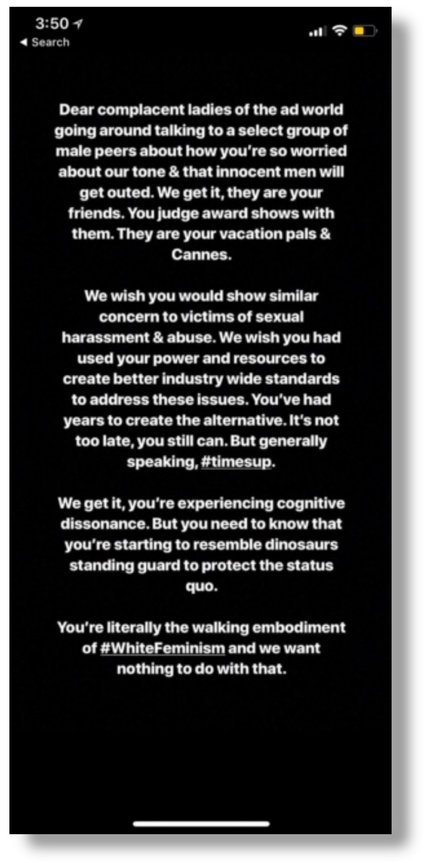The account, which was recently made visible to anyone rather than just its followers, has garnered many fans, especially among younger people in the industry who see it as a vehicle for exposing men who have escaped consequences for their misdeeds. Others feel that it has led to trial-by-strangers on social media.

“It’s one of the moments where everyone takes an inventory, both individuals and agencies,” said Kat Gordon, the founder of the 3% Movement, which promotes the role of women in creative leadership at advertising companies. Ms. Gordon said she was conflicted about the Instagram account’s approach, but said she understood the frustration of women “who didn’t feel like they had justice.”
“I’m sad that they exist, but I think the fact they exist is emblematic of something that’s really broken,” she said of @DietMadisonAve. “Sometimes you need a grenade.”
Advertisement
Continue reading the main story
The account has published names of alleged harassers along with details of what they’ve been accused of through Instagram Stories that disappear after 24 hours. and often consist of blocks of text against a solid background, or captions splashed onto screenshots of news articles and messages sent to the account.
An operator of the account, communicating through private messages on Instagram, said it had shared 17 names of alleged harassers and had collected an additional 158 that it had not yet vetted. The person said the group vetted allegations before making them public, by verifying work histories and obtaining supporting documents like nondisclosure agreements. The sender declined to provide more specific details, citing legal reasons.
Men who have been dismissed from agencies after being accused of harassment are sometimes featured in photos with pig noses or comments like “Bro You’re Fired” superimposed over them. A photo of one female executive appeared on the account accompanied by the label “Complicit Enabler.” In one instance, the account posted the name of a man to its Instagram Stories. The next post tagged his employer and asked, “Why does he still work for you when it’s openly known that he’s a sexual predator?” It went on: “What’s it going to take? Physical assault? Oh wait … ”

One of the operators of the account said that the group believed eight men it named had been fired, including by the agencies Droga5 and Wieden + Kennedy, where such exits are generally accompanied by nonspecific official statements invoking company values and guidelines.
Messages directed at the agencies and people accused of wrongdoing are often paired with phrases like, “You are on notice,” and “You had your chance to self police. And you failed.” (The account shared an observer’s recent comment comparing its tone to “Gossip Girl meets Robin Hood.”) Mixed in with the allegations are memes and other posts that celebrate diversity, feminism, female leaders in the industry and the #MeToo movement.
An operator of the account said its name was inspired by Diet Prada, an Instagram account known for calling out copying in the fashion industry that has also recently drawn attention to sexual harassment accusations in fashion.
As the account has expanded, there has been resistance. A group of women who work with agencies published a letter on Monday that criticized the account’s tone and anonymity, saying, “It is not acceptable to use an anonymous social media account to accuse people, pass judgment, and use other bullying techniques to help the victims.”
Karen McKibben, a freelance executive producer who signed the letter, said that as people report harassment allegations to the account rather to than their companies, “It just becomes this trial by social media and men just don’t have a chance to respond or defend themselves.”

She added, “Because it’s done anonymously, you can’t hold anybody liable for potential slander or hold them accountable for what they’re posting because there’s no person to report to or complain to.”
Advertisement
Continue reading the main story
The account responded on Twitter, accusing the women of causing the Instagram page shutdown and saying they had “loads of internalized misogyny” and were “trying to drum up business” by defending men. Women who had signed the letter, in turn, denied those claims and said that the account stood for “anonymous cyberbullying and unfair prosecution.”
The Instagram account follows the lead of a spreadsheet that circulated among journalists last fall that sought to collect the names of men described by colleagues as sexists, sexual harassers and rapists. It was taken down by its creator about 12 hours after it was made, but lived on through screenshots and downloads and prompted investigations at media companies. Several men whose names were on the list subsequently lost their jobs.
While the document raised questions about the ethics of anonymous accusations, it was also praised for providing women with a new way to warn one another about certain men in the media industry and to hold them accountable.
As @DietMadisonAve has solicited stories from women, its unnamed operators have said they can connect accusers with investigative reporters and with lawyers who specialize in sexual harassment litigation. The account also offers to guide women on whistle-blower laws, how to approach human resources departments with complaints and ways to find mental health counselors. The goal, those involved with the account said, is for advertising agencies to enforce zero-tolerance policies for sexual misconduct.

“Women have always shared the names of sexual predators inside and outside of the workplace with one another,” the group said in a lengthy document about its mission that it shared with The New York Times. “We are just one part of how that’s now being done on social media.”
The document also noted that the group was formed after its members learned of how harassment complaints were handled at the Martin Agency, which has since dismissed its chief creative officer. Individuals were too scared or too intimidated to speak on the record, the group said, because the ad industry “has an infamous history of protecting the abusers and marginalizing the victims.”
None of the ad agencies contacted for this article would comment on @DietMadisonAve.
Ms. Gordon of the 3% Movement said the attention drawn by the account would be noticed by agency human resources departments.
Advertisement
Continue reading the main story
“The goal going forward is that anyone that goes to H.R. with a complaint will be met with more belief, that they’re telling the truth, and more follow-through on the part of H.R.,” she said. “I can’t imagine how that couldn’t be a ramification of this.”
The group behind the account said that some of its members were forming separate lobbying and educational groups — although not under the @DietMadisonAve name — that would continue to address problems of discrimination, diversity and sexual harassment at ad agencies.
For now, the account seems to be moving forward, posting links to its Snapchat and Twitter accounts after the Instagram shutdown in preparation for any future disruptions.
On Tuesday, @DietMadisonAve posted a poll on Instagram Stories: “Should we stick to ad land or get into media too?” Screenshots of followers’ replies suggested people wanted more.
Continue reading the main story
Article source: https://www.nytimes.com/2018/03/07/business/media/diet-madison-avenue-instagram.html?partner=rss&emc=rss
Speak Your Mind
You must be logged in to post a comment.